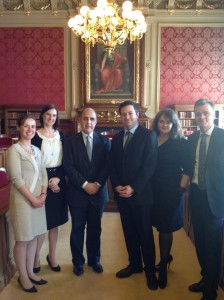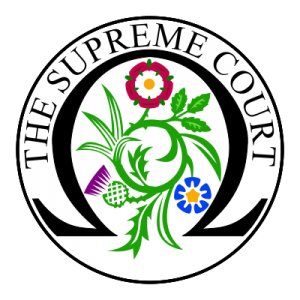
For the legal year September 2011 to July 2012, I was appointed Judicial Assistant to Lord Wilson and Lord Sumption at the UK Supreme Court.
Judicial Assistants work closely with their allocated Justices so the nature of the role varies, but everyone prepares short summaries of applications for permission to appeal; reads skeleton arguments and authorities, attends hearings and speaks to their Justices about particular appeals; as well as drafting press summaries of judgments. Research is also required for cases and extra-judicial speeches covering topics as varied as the legal history of the wife, the justiciability of foreign affairs in English courts and the treatment of economic torts in Australia.
Highlights of the year included the Assange extradition hearing and sequelae; Rabone, a very sad case concerning whether damages should be available to parents of a woman who committed suicide after release from voluntary mental health treatment and RT (Zimbabwe) in which the Supreme Court held that politically neutral asylum seekers could not be removed to Zimbabwe where they would have to declare allegiance to Zanu-PF.
The role is an extraordinary opportunity to observe on a daily basis advocacy from senior silks on complex and finely balanced points of law. One learns what to do from the best advocates (and, occasionally, what not to do). It is interesting to see how the Justices perceive points: which change minds, which lose cases and which are simply lost in the midst of argument.
I had previously undertaken only a year of legal study in the Graduate Diploma in Law at City University, although many Judicial Assistants have a law degree and/or the BCL. So for me, the opportunity furthered my legal education and understanding. I was exposed to the law of limitation in personal injury, aspects of shipping law, the finer elements of insolvency law and (for an English practitioner at least) more esoteric matters in the Judicial Committee of the Privy Council such as Jamaican land law and that concerning the temporary promotion of Trinidadian prison officers. Not all of this will be directly applicable to my practice – but developing the intellectual stamina and flexibility needed to read into four difficult appeals in a week certainly will, as will the assurance acquired by diving frequently into an unknown area of the law and being forced to rapidly develop an understanding.
The great advantage of the role is that it is hard to be wrong: some learned judge or other has probably taken your point of view on the case’s journey to the Supreme Court. Nevertheless, it is a formidable challenge to be asked by a Supreme Court Justice early on a Monday morning for an opinion, and to have that position challenged. Imagine the most intimidating tutorial you ever had amplified tenfold, although the Justices tend to gloss over one’s less lucid moments more kindly than they do those of Counsel. The confidence that each of us gained from being exposed to such trials and perhaps even managing to make a decent point or two, or at least to survive, is invaluable.
It is a tremendous privilege to spend time with the Justices discussing legal and non-legal ideas. It is also a wonderful insight to see how human the Justices are, although discretion shall be the better part of valour on exactly what we discovered.
There are seven Judicial Assistants appointed each year and one permanent Judicial Assistant. Part of the fun of the job was to meet other lawyers at the start of their careers, to debate points of law amongst ourselves and to see the different perspectives that we had each developed in our previous legal and non-legal careers.
The seven Judicial Assistants were also privileged to experience visits to the US Supreme Court, where we met with Justice Scalia, and the Conseil d’État and Conseil Constitutionnel in Paris; tour Westminster Abbey with the Dean; and have access to the House of Lords library. By July, we were all ready to return to practice and to apply the lessons gleaned from the year to our own advocacy, knowing that both our skills and career prospects have undoubtedly been improved. We are all indebted to our Justices, from whom we have learnt so much.

I would recommend the role to anyone commencing his or her legal career. The only downside is that my only legal anecdotes all start with “when I was at the Supreme Court, Lord X said…” which does sound like shameless namedropping and for which I have been rightly teased. I shall have to develop other legal anecdotes during the rest of my career.
The Judicial Assistant scheme is open to barristers who have completed pupillage and qualified solicitors. Most Judicial Assistants are in their first couple of years of practice. Applications can be made on the Supreme Court website, between the end of February and the end of March. Appointments are made in June/July to commence in September. Do apply!
Maria Roche is a barrister at 1 Crown Office Row with an interest in public law, human rights, clinical negligence and personal injury. She writes regularly for the UK Human Rights Blog, with many of these re-printed in Inforrm, International Forum for Responsible Media Blog.
